| Srl | Item |
| 1 |
ID:
175536


|
|
|
|
|
| Summary/Abstract |
Tragedy is one of the oldest metaphorical lenses of International Relations. The tragic vision of politics, from Thucydides to contemporary realist theorists, lies at the core of classical realism. However, it is striking how rarely the concept of tragedy has been applied to the discourse of humanitarian intervention. This lacuna is a weakness on both the intellectual and political levels, as nowhere are clashes between competing ethical perspectives more glaring. An examination of the concept of tragedy, as conceived from its Greek origins, can illuminate an understanding of the morally contradictory imperatives created by armed intervention. Using the Bosnian War as a case study, Greek classical tragedy provides a framework to grasp the agonising choices and insoluble ethical dilemmas brought about by humanitarian intervention, in contrast to mere narratives of salvation. The argument conveyed in this article seeks to reconcile a tragic vision with the idea of progress and political action. It concludes by suggesting that the fundamental lessons that lie at the heart of tragedy should be associated with another major concept in Greek culture, namely, the Aristotelian idea of phronesis or ‘practical wisdom’.
|
|
|
|
|
|
|
|
|
|
|
|
|
|
|
|
| 2 |
ID:
066950
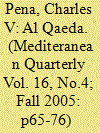

|
|
|
| 3 |
ID:
130239
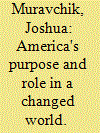

|
|
|
|
|
| Publication |
2014.
|
| Summary/Abstract |
Almost every war that America has fought since the beginning of the twentieth century was a war America had determined to avoid. We were neutral in World War I?.?.?.?until unlimited submarine warfare against our trans-Atlantic shipping became intolerable. We resisted entering World War II until Pearl Harbor. We defined the Korean peninsula as lying outside our "defense perimeter," as our secretary of state declared in 1950, a few months before North Korea attacked South Korea and we leapt into the fray. A few years later, we rebuffed French appeals for support in Vietnam in order to avoid involving ourselves in that distant country which was soon to become the venue of our longest war and greatest defeat. In 1990, our ambassador to Iraq explained to Saddam Hussein that Washington had "no opinion on?.?.?.?your border disagreement with Kuwait," which he took as encouragement to swallow his small neighbor, forcing a half million Americans to travel around the world to force him to disgorge it. A year after that, our secretary of state quipped about the violent disintegration of Yugoslavia that "we have no dog in that fight," a sentiment echoed by his successor, of the opposite party, who, demonstrating his virtuosity at geography, observed that that country was "a long way from home" in a place where we lacked "vital interests"-all this not long before we sent our air force to bomb Serbia into ceasing its attacks on Bosnia and then bombed it again a few years later until it coughed up Kosovo.
|
|
|
|
|
|
|
|
|
|
|
|
|
|
|
|
| 4 |
ID:
057688
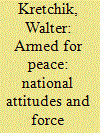

|
|
|
| 5 |
ID:
095996
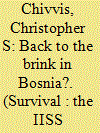

|
|
|
|
|
| Publication |
2010.
|
| Summary/Abstract |
Today in Sarajevo there is disturbing talk of an unravelling of the Dayton Accords that ended the bloody civil war there 14 years ago. Nearly 100,000 people were killed in that war, which pitted Muslims against Serbs against Croats, and saw Europe's nastiest massacres since the Second World War. Since 1995, Bosnia has been at peace, but the main political parties continue to fight over the basic issues that started the war almost two decades ago. Concern over the general political situation has increased as nationalist rhetoric has raised the spectre of a re-division of the country and an ensuing descent into violence. Some in Sarajevo even evoke the possibility of 'European Gazas' emerging in some parts of the county, where there are hints that unemployed Muslim youth may be coming under the influence of a radical, foreign brand of Wahhabist Islam.
|
|
|
|
|
|
|
|
|
|
|
|
|
|
|
|
| 6 |
ID:
015827
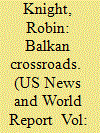

|
|
|
|
|
| Publication |
May 3,1993.
|
| Description |
53-55
|
|
|
|
|
|
|
|
|
|
|
|
|
|
|
|
| 7 |
ID:
015243
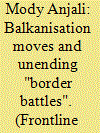

|
|
|
|
|
| Publication |
Feb 13-26, 1993.
|
| Description |
52-55
|
|
|
|
|
|
|
|
|
|
|
|
|
|
|
|
| 8 |
ID:
107148
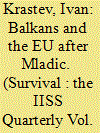

|
|
|
|
|
| Publication |
2011.
|
| Summary/Abstract |
Ten years after the last war in the region, the Balkans is still an assemblage of frustrated protectorates and weak states. Bosnia and Kosovo are trapped in the labyrinthine politics of semi-independence; Albania, Macedonia and Montenegro are small and claustrophobic republics with populist and divisive governments and opposition forces that are discouraged and discouraging at the same time. Serbia has not yet made up its mind how to reconcile its position on Kosovo with its aspiration to join the European Union. Croatia has succeeded in its accession talks with the EU, which closed on 30 June 2011, but the mood of the public is dire due to mismanagement and corruption scandals. The Balkans currently reflects a mixture of Greek-style economic problems, Berlusconi-style politics and Turkish-level hopes when it comes to joining the EU. With Italy and Greece facing deep political and economic troubles of their own, the Balkans has lost its natural advocates for EU membership.
|
|
|
|
|
|
|
|
|
|
|
|
|
|
|
|
| 9 |
ID:
015832
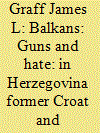

|
|
|
|
|
| Publication |
May 24, 1993.
|
| Description |
22-27
|
|
|
|
|
|
|
|
|
|
|
|
|
|
|
|
| 10 |
ID:
016102
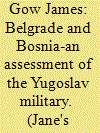

|
|
|
|
|
| Publication |
June 1993.
|
| Description |
243-246
|
|
|
|
|
|
|
|
|
|
|
|
|
|
|
|
| 11 |
ID:
009887
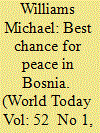

|
|
|
|
|
| Publication |
Jan 1996.
|
| Description |
4-7
|
|
|
|
|
|
|
|
|
|
|
|
|
|
|
|
| 12 |
ID:
114721
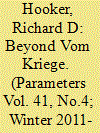

|
|
|
| 13 |
ID:
108697
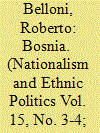

|
|
|
|
|
| Publication |
2009.
|
| Summary/Abstract |
The process of implementation of the Dayton Peace Agreement in Bosnia has come to a halt. Particularly since 2006, nationalist rhetoric has increased, political, economic, and social reforms have stalled, and some analysts warn that the country might be sliding towards collapse. This article traces the roots of the current crisis in the 2006 failed constitutional reform attempt, which has highlighted the precarious state of the Bosnian political situation and, more broadly, in the limited impact of the international community's illiberal, top-down strategies employed in the country since almost the beginning of the peace process. It concludes by suggesting the need for a new approach, led by the European Union, and aimed at reviving the domestic political process.
|
|
|
|
|
|
|
|
|
|
|
|
|
|
|
|
| 14 |
ID:
012752
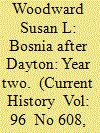

|
|
|
|
|
| Publication |
march 1997.
|
| Description |
97-63
|
|
|
|
|
|
|
|
|
|
|
|
|
|
|
|
| 15 |
ID:
013145
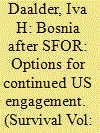

|
|
|
|
|
| Publication |
1997.
|
| Description |
p5-18
|
|
|
|
|
|
|
|
|
|
|
|
|
|
|
|
| 16 |
ID:
142273
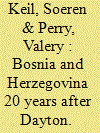

|
|
|
|
|
| Summary/Abstract |
It has been 20 years since the Dayton Peace Agreement (DPA, official name: General Framework Agreement for Peace in Bosnia and Herzegovina) ended the bloodiest war in Europe since World War II. The violent conflict and the peace agreement demonstrated many of the tectonic changes that Europe and the world as a whole went through after the end of the Cold War. First, the wars highlighted the inability of the European Community (after 1993 European Union (EU)) to end the conflict, because of its Member States' disagreement on strategies and options, including the threat of military intervention, and the brilliant recognition and manipulation of this wavering by Balkan leaders. Reflecting this European discord, the DPA secondly highlighted the importance of the United States as the only remaining superpower capable of decisively intervening to end the violence in Southeastern Europe. The perception of a weak EU and a strong US willing to use military force would be further strengthened when NATO, significantly led by the US, intervened in the Kosovo war in 1999. Third, the war, and the consequent peace agreement also highlighted that the end of the Cold War by no means resulted in an end of violent conflict in Europe and beyond. Francis Fukuyama's thesis of the “End of History” and the victory of capitalism and democracy proved to be wrong, shortly after it was formulated. Finally, the war in Bosnia and the resulting peace agreement raised new discussions about the drivers of political violence and conflict, the role of ethnicity in democratic systems and institutional options available to overcome such wars and build and consolidate democracies.
|
|
|
|
|
|
|
|
|
|
|
|
|
|
|
|
| 17 |
ID:
142274
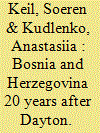

|
|
|
|
|
| Summary/Abstract |
This article will start with an analysis of the Dayton Peace Agreement, and assess to what extent it focused on peace-building, state-reconstruction and democratization. It will provide an overview of major peace-building, state-reconstruction and democratization initiatives by international and local actors in post-war Bosnia. Following the often-presented argument that ‘Dayton is a good peace agreement but a bad blueprint for a democratic state’, the article will ask if the Dayton Peace Agreement has failed in the consolidation of Bosnian statehood and the democratization of the country. In order to do this, an in-depth analysis of the current situation in terms of state consolidation and democratization will be given. The main argument of the article demonstrates that while the Dayton Agreement had some inherent weaknesses, actions by local elites and international state-builders also explain some of the current issues of the Bosnian state.
|
|
|
|
|
|
|
|
|
|
|
|
|
|
|
|
| 18 |
ID:
009489
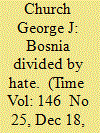

|
|
|
|
|
| Publication |
Dec 18, 1995.
|
| Description |
28-31
|
|
|
|
|
|
|
|
|
|
|
|
|
|
|
|
| 19 |
ID:
010292
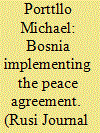

|
|
|
|
|
| Publication |
Feb 1996.
|
| Description |
27-30
|
|
|
|
|
|
|
|
|
|
|
|
|
|
|
|
| 20 |
ID:
072190
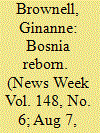

|
|
|